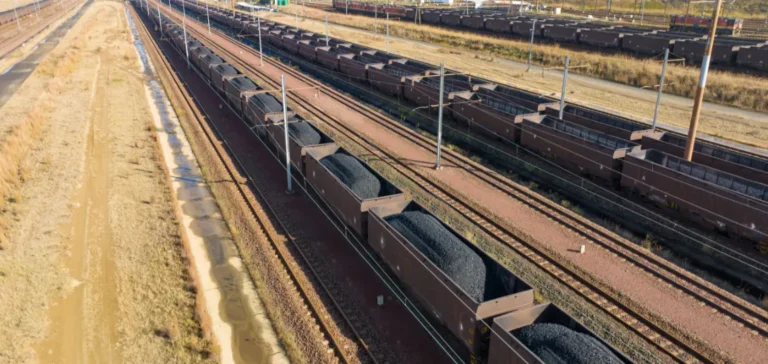South Africa has initiated a partial liberalisation of its railway network to improve the logistics of its mining exports, particularly thermal coal. Transnet SOC Ltd., through its division Transnet Rail Infrastructure Manager (TRIM), has recently finalised the licensing of 11 private operators to run 41 rail lines and six logistics corridors for a period of up to ten years. The objective is to enhance the transport of goods, including coal, chrome, manganese and fuels, to key export ports.
This initiative comes after years of underinvestment and structural issues that have held back the mining sector. The implementation of these new partnerships could improve the reliability of rail transport, a strategic component for Richards Bay Coal Terminal (RBCT), the country’s main coal export hub.
New access for coal producers
South African mining companies Menar and Exxaro Resources Ltd. have already signed agreements with Transnet for access to selected rail routes. These preferential accesses aim to optimise the flow of goods, reduce operational costs and increase the competitiveness of South African coal against international competitors. Other mining companies are expected to join the system in the coming weeks.
Export volumes from RBCT reached 52.1 million tonnes in 2024, up from 47.2 million in 2023. The first half of 2025 has already recorded more than 27 million tonnes shipped, placing the annual target of 55 million tonnes within reach. This recovery is partly attributed to logistical improvements and the growing involvement of the private sector in the rail network.
Optimised costs in a pressured market
The ongoing decline in thermal coal prices FOB Richards Bay — down to $65.50/mt in July 2025 from a peak of $429.90/mt in March 2022 — has significantly impacted producers’ margins. In this context, more efficient rail logistics would allow export costs to drop, making South African coal more competitive in Asian markets.
Frequent disruptions on lines previously operated solely by Transnet had put South African suppliers at a disadvantage compared to producers in Russia, Australia, Colombia and Indonesia. These countries benefit from more reliable logistics infrastructure, facilitating long-term contract commitments with Asian buyers.
Visible results from Transnet’s recovery plan
Since the launch of its recovery plan in August 2023, Transnet has recorded several operational improvements. The number of cable theft incidents dropped from 5,506 in 2021-22 to 3,877 in 2022-23, with losses reduced from Rand 2.10bn ($110mn) to Rand 1.68bn ($88mn). Additionally, the operational locomotive fleet was reinforced, enabling an 8.7% increase in rail freight volume, reaching 193 million tonnes expected in the 2024-25 fiscal year.
Port capacity also improved, with container handling rising from 4,229 units in 2022-23 to nearly 5,000 in 2024-25. Automotive throughput also increased. These developments helped enhance the efficiency of shipments from RBCT.
Partnerships still in adjustment phase
Private sector partners must now adapt their operations to a network previously dominated by centralised management. Industry leaders nonetheless consider the early results encouraging. According to Menar’s Managing Director Vuslat Bayoglu, progress already seen on the ground could, within two to three years, significantly reduce the country’s remaining logistical challenges.
Ongoing negotiations between Transnet and the selected operators are expected to gradually increase rail traffic, enabling South African exporters to regain position in a rapidly evolving global thermal coal market.






















